Cats can be sweet and loving. Cats can also be sneaky and full of trouble. No other pet has quite as much personality as a cat! In my fifteen years as a practicing veterinarian, I have come to love all animals, but cats are indeed unique.
I have been lucky enough to have shared my life with some very special cats. Like all owners, I enjoy giving my cats a little treat every now and then. I am always careful, though, to ensure that the treats I am offering are safe and that I use moderation.
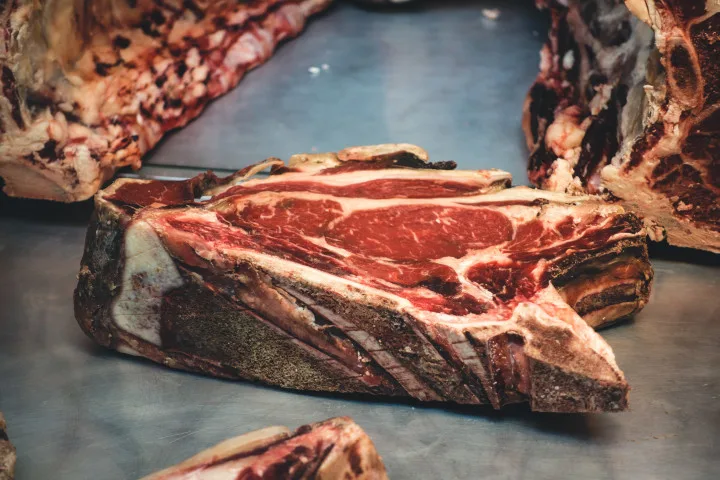 A cat can eat beef jerky. However, beef jerky is likely not the healthiest choice of treat for your kitty. Cats are carnivores, so they will love the fact that beef jerky is made out of meat.
A cat can eat beef jerky. However, beef jerky is likely not the healthiest choice of treat for your kitty. Cats are carnivores, so they will love the fact that beef jerky is made out of meat.
Unfortunately, beef jerky is also extremely salty, contains many spices that may hurt your kitty’s tummy, and is packed full of nitrites and other unhealthy preservatives.
Wondering what your cat can and cannot safely eat is very common. As a veterinary hospital, my practice receives phone calls every day with questions about this topic.
There are definitely a number of foods that should absolutely be avoided as they are toxic to cats and can cause harm, even death. After that, it essentially is a matter of what your cat enjoys, as well as what its stomach can handle.
Cats are curious creatures, and what one cat loves as a treat may cause another to turn up its nose. Finding the perfect treat for your cat may involve some trial and error.
Treating Your Cat
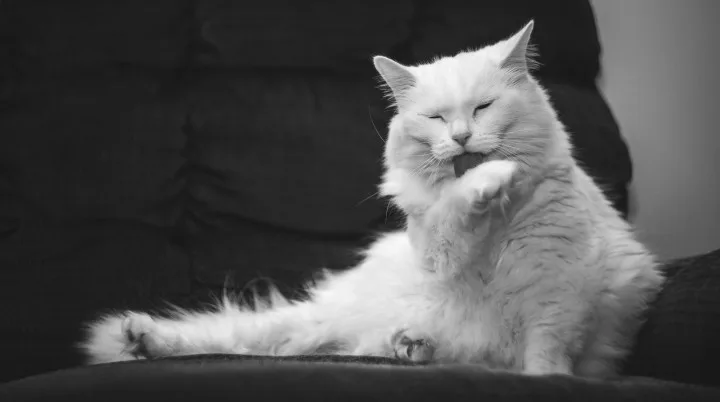 They say the way to truly bond with anyone is through food. Cats are no different. Treats can be used as a method to increase the love between humans and pets.
They say the way to truly bond with anyone is through food. Cats are no different. Treats can be used as a method to increase the love between humans and pets.
Bonding can also be accomplished through playing with your cat, petting them, brushing them, giving lots of pets and snuggles, and simply spending time together.
Though the food may be the way to your cat’s heart, don’t forget that too much food can be very dangerous.
Giving a cat excessive amounts of food leads to weight gain. This can occur with their regular diet or treats; it does not matter where the calories are coming from.
Obesity, or even being overweight at all, is a major contributing factor to health issues such as arthritis, heart disease, and diabetes.
To gain the advantages of bonding with your cat using something they love, like food, but without feeding them a lot of excess calories, treats can be the answer. It is vital to choose the right treat, however.
Should Human Food Be Your Cat’s Treat?
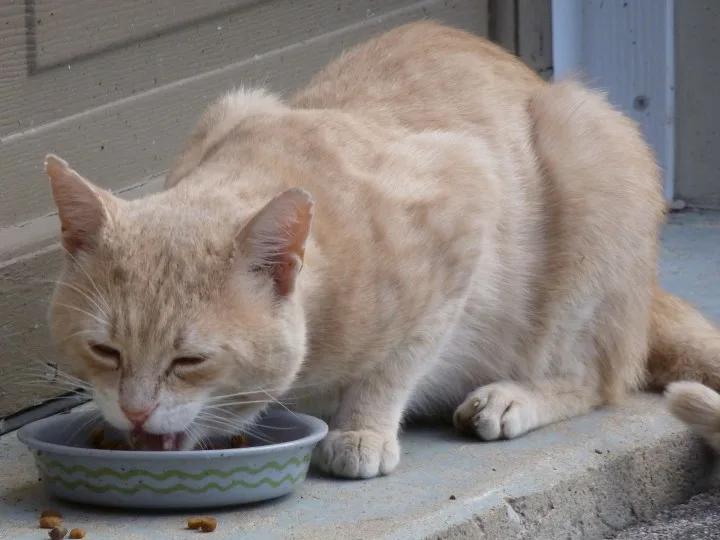 Many cats think that human food is the greatest thing since sliced bread, while others are perfectly content to eat only cat food.
Many cats think that human food is the greatest thing since sliced bread, while others are perfectly content to eat only cat food.
If you have a very food-motivated cat that will perform crazy acrobatics to break into the refrigerator or walk across a hot stove to get your food, it may be best not to use human food as a treat.
Allowing cats to eat human food as a treat will often make these crazy kitties worse, which can be an annoyance for their owners but possibly dangerous for the cat.
Many owners also object to their cats begging in the kitchen or at the dinner table.
If this behavior is to be discouraged in your household, then human food should not be used as a treat. A cat that is never given human food is much less likely to think it can have it.
Only Small Amounts
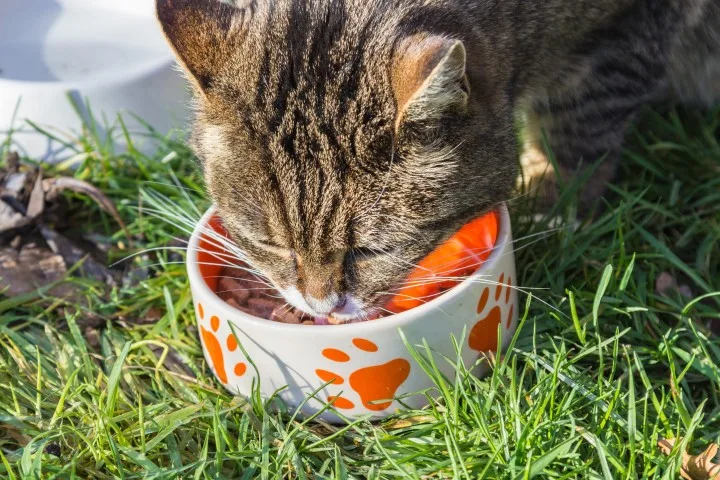 In the event that your cat is allowed to eat human food, care must be taken to ensure that you only allow the kitty to have small amounts.
In the event that your cat is allowed to eat human food, care must be taken to ensure that you only allow the kitty to have small amounts.
The foods we eat as humans tend to be packed with calories as opposed to cat food, so your cat eating a small bite of your lunch can be the caloric equivalent of you eating an entire cheeseburger.
Not only can the extra calories end up making a cat overweight, but a cat who overindulges in human food often is not hungry for its own food.
Not wanting to eat cat food is dangerous if it frequently happens, as they may not get the cat-specific nutrients they require.
All cats must eat a required amount of taurine on a regular basis. Taurine is an amino acid that cats are unable to synthesize from food.
Cat foods are formulated to contain high levels of taurine, but human food does not have enough to keep a cat healthy. For this reason, you must ensure that your cat is eating a diet primarily consisting of cat food.
Human Foods Never To Feed Your Cat
The most important thing to keep in mind when considering feeding human food as a cat treat is what foods may be dangerous.
In the event that your cat was ever to eat any of these foods, please call your nearest veterinarian immediately.
Chocolate

Science says that cats do not have the receptors on their tongues to taste sweet, but almost anyone who has had a cat would likely disagree.
Cats seem to love eating sweet things, and chocolate is no exception. Just as it is toxic to dogs, chocolate is also toxic to cats.
A chemical called theobromine, which is contained in chocolate, and is in higher concentrations in baker’s and dark chocolate, cannot be metabolized by cats. If an adequate amount is eaten, this toxicity can be fatal.
Grapes And Raisins
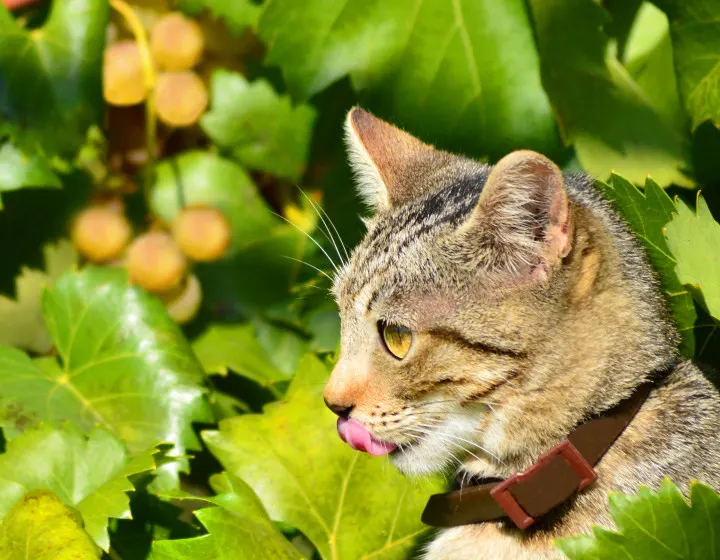 Everyone thinks of fruit as a healthy snack, and grapes and raisins are cat-sized and sweet too! Unfortunately, while these two seem like they would make the perfect healthy snack, they can cause life-threatening kidney failure.
Everyone thinks of fruit as a healthy snack, and grapes and raisins are cat-sized and sweet too! Unfortunately, while these two seem like they would make the perfect healthy snack, they can cause life-threatening kidney failure.
Grape and raisin toxicity is most commonly diagnosed in dogs, but cats also should never eat these fruits. The reason grapes and raisins cause kidney failure had been a mystery for many years, but recently scientists have discovered the cause.
Tartaric acid found in grapes and raisins negatively affects the kidneys and leads to their failure. Sadly, this kidney failure happens within days and can be fatal.
Onions And Garlic
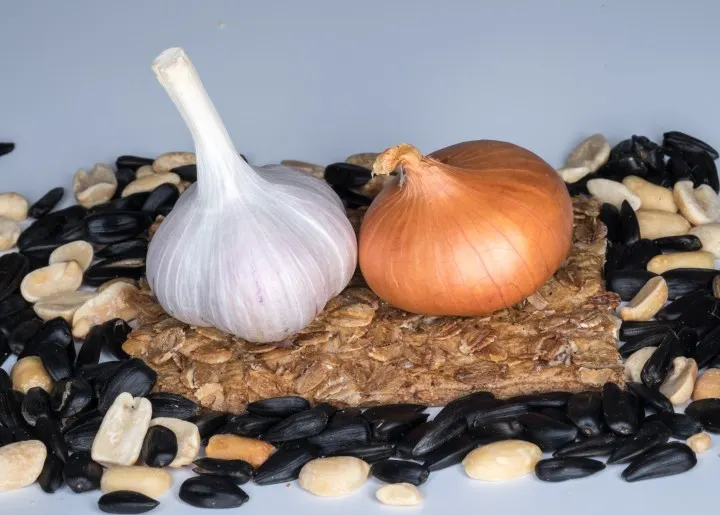 Though some cats enjoy the taste of both onions and garlic, these are two herbs that should never be fed to a cat. Both in the Allium family, onions and garlic can cause a blood disorder called hemolytic anemia.
Though some cats enjoy the taste of both onions and garlic, these are two herbs that should never be fed to a cat. Both in the Allium family, onions and garlic can cause a blood disorder called hemolytic anemia.
If the anemia is left untreated, the condition can be fatal. It is essential to ensure that your cat does not eat onions or garlic, or foods that contain them.
Human Foods That Cats Can Eat
Now that we know what foods not to share with a cat, we can move on to discussing the foods that we can share with our feline friends. There are quite a few foods that you probably enjoy that your cat will too!
Meats
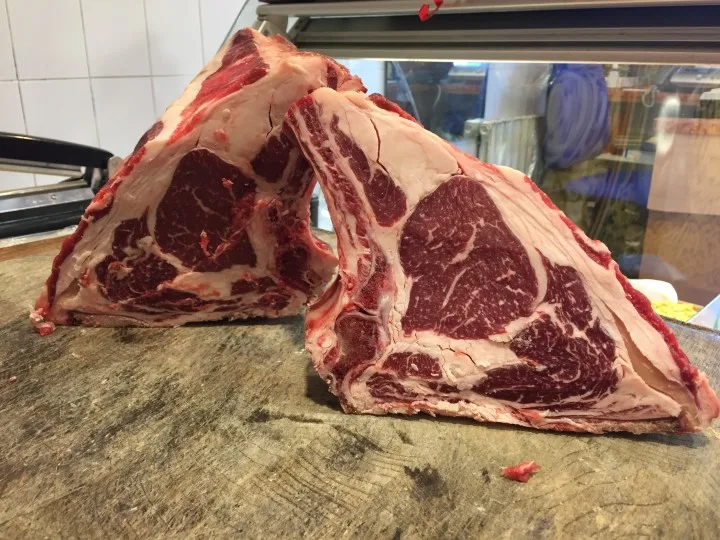 As discussed earlier, cats are true meat-eaters; they have no need for grains in their diets. This is called an “obligate carnivore.”
As discussed earlier, cats are true meat-eaters; they have no need for grains in their diets. This is called an “obligate carnivore.”
They may eat other things, including grasses and grains, but they do not need to do so to survive.
Despite this, some domestic cats have developed a taste for all manner of non-meat products such as sweets, baked goods, fruits, and vegetables, so just because they don’t require them does not mean they do not like them!
Still, the vast majority of cats will prefer meat. But when you are choosing a treat for your cat, the most important thing to remember is safety first.
Then, if it is safe, you can try a few things and find out what treats your cat enjoys the most. Keep in mind, especially with calorically dense products like meat. Small treats are key to managing a cat’s weight.
A tiny sliver of meat, for example, ham, turkey, or roast beef, is likely the best choice to try with your cat as a treat.
A pinch of lunch meat from your sandwich or a bit of meat from your dinner’s main course can be an easy way to share the love with your cat without a lot of extra effort or shopping. Be wary of overly spicy meats as they may result in a gastrointestinal upset for your cat.
Fish
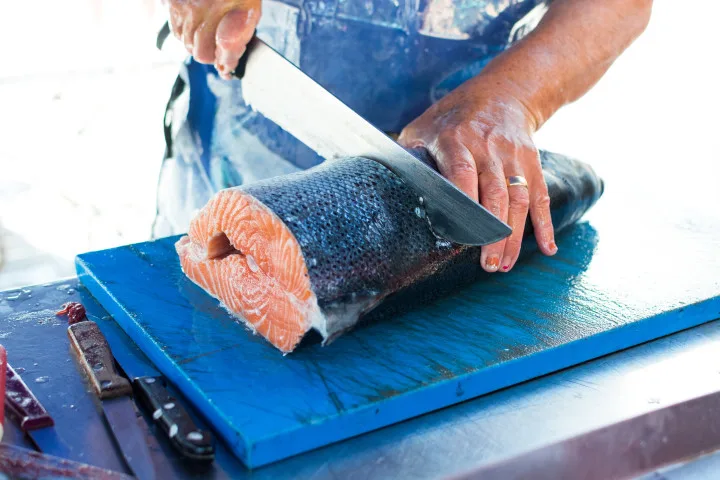 What cat doesn’t love fish? Whether you are having a little tuna salad for lunch or salmon for dinner, you likely will not have to ask your cat twice if they would like a bite.
What cat doesn’t love fish? Whether you are having a little tuna salad for lunch or salmon for dinner, you likely will not have to ask your cat twice if they would like a bite.
Fish is high in omega fatty acids and protein and makes a healthy treat for cats.
Cheese And Eggs
 Another snack that packs a protein punch, cheese, and eggs both are favorites among cats. Cats enjoy the taste, while their pet parents enjoy the ease.
Another snack that packs a protein punch, cheese, and eggs both are favorites among cats. Cats enjoy the taste, while their pet parents enjoy the ease.
Always cook the eggs before giving them to your cat, as raw eggs may contain bacterial contamination.
Fruits and Crackers
 A little outside of the box, but the next time you are snacking on fruit, crackers, bread, cookies, or even popcorn, give a small bite to your cat and see if they enjoy it. These foods can make great treats in small amounts.
A little outside of the box, but the next time you are snacking on fruit, crackers, bread, cookies, or even popcorn, give a small bite to your cat and see if they enjoy it. These foods can make great treats in small amounts.
Why Is Beef Jerky Not Healthy For Cats?
Traditional beef jerky consists mainly of beef and is first soaked for long periods in a curing solution and then dried. Some versions of jerky are made with venison, turkey, or other meats.
To make the beef jerky, the meat is covered with spices such as salt, pepper, vinegar, and garlic, making the snack enticing for humans.
To add more flavor, the meat used to make the beef jerky is soaked in a curing solution. The drying and curing make the jerky safe to eat. The curing solution used for beef jerky is typically made up of water, salt, and sodium nitrite.
This process leaves the jerky with a very high sodium content and full of the preservative sodium nitrite. These two factors make this an unhealthy treat for a cat.
Another reason to avoid beef jerky as a treat for your cat is the number of spices in and on the meat. These spices can be hard on the cat’s more delicate gastrointestinal system leading to vomiting, stomach pain, and diarrhea.
If a cat has eaten beef jerky and is exhibiting signs of illness, it should be seen by the nearest veterinarian as soon as possible.
What To Look For In A Cat Treat
Every pet parent wants the best for their furry friend. It would help if you kept in mind some essential tips when choosing a treat to feed your cat.
These tips apply whether you are shopping for a commercially made treat or simply looking around your kitchen.
- High quality and high protein are essential. Cats, as carnivores, do better on high-protein diets. Even with their treats, we want the first few ingredients on the ingredient list to be high-quality sources of protein, such as whole meats.
- Shop brands you trust. Just as when you are shopping for products for yourself, when shopping for your pet, you want to buy from companies that you know and trust. Read the label and look for treats and foods made in the USA to ensure safety.
- Choose treats that are low in salt and sugar. Salt and sugar add taste to treats, but they don’t add to the health of your cat. Try to avoid these as much as possible.
- Go “all natural.” Choose treats labeled as all-natural and those that contain as few preservatives as possible.
- Cooked treats are the safest. Ensure that all food and treats that you feed to your cat are thoroughly cooked. The bacteria in raw meat may make your pet sick but are more likely to pose a risk to you and your family members.
The Wrap On Cat Treats
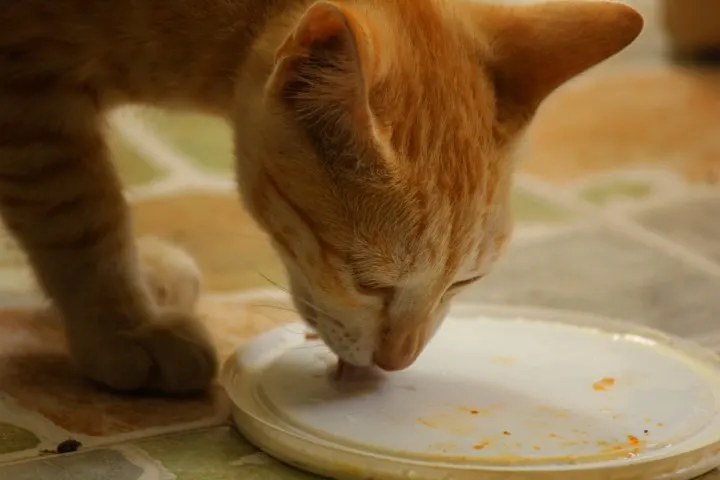 Cat treats can help strengthen the special bond between you and your cat. You don’t have to go far or buy fancy treats; many good options can be found at home in your kitchen.
Cat treats can help strengthen the special bond between you and your cat. You don’t have to go far or buy fancy treats; many good options can be found at home in your kitchen.
Be sure to choose safe treats and avoid any possibly toxic foods.
Sharing a bit of your food can be a fun way to make your cat feel extra special. If you are considering beef jerky as a cat treat, though cats can technically eat it, I recommend keeping the jerky to yourself.
Lastly, always give treats to cats in moderation, as obesity has dire health implications.
Dr. Jamie Whittenburg is a vet with 15 years of clinical experience. She graduated from Kansas State University College of Veterinary Medicine in 2006. Her area of expertise is small animal general practice, equine practice, surgery, and academia.
Dr. Whittenburg operates her own hospital in Lubbock, TX, named Kingsgate Animal Hospital. Medically, she’s most interested in practicing general surgery and feline medicine. When not at work, Dr. Whittenburg enjoys outdoor activities, reading, and spending time with her family.

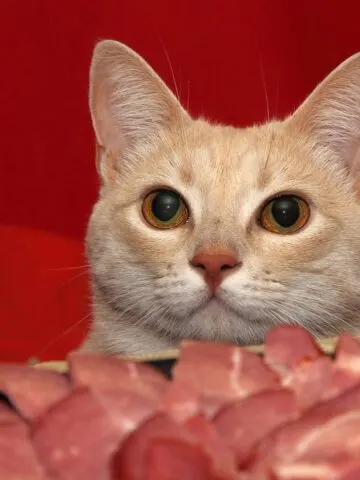

Leave a comment
You must be logged in to post a comment.